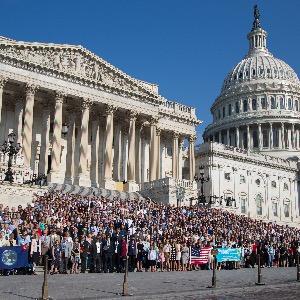
Revenue Neutral Carbon Fee and Dividend: Bending the Emissions Curve by CitizensClimateLobby
 Peter Joseph Sep 1, 2017 08:50 | Proposal contributor Hello CoLab Community, We're back with an updated proposal. Hope you enjoy it. Please try to take the time to follow the many links for the "full experience." --The CCL team
|
 Linh Ki?u Sep 4, 2017 02:17 | Your article is detailed, thanks to it I solved the problem I am entangled. I will regularly follow your writers and visit this site daily. wings io |
 Rose Anderson Sep 26, 2017 09:32 | The US should do our part to help solve climate change. But wouldn't it be great if the solution could actually help the economy while reducing emissions? The "revenue neutral" part of Revenue Neutral Carbon Fee and Dividend allows us to send a powerful market signal without putting a drag on economic growth or job creation. And by nature, the equitable distribution of the dividend means that low-income folks will benefit from this policy (it's progressive). This is one of the most effective, just, and reasonable policies to address climate change I've seen. |
 Eric Strid Oct 10, 2017 11:40 | Many people are convinced that putting a price on carbon is the Holy Grail of climate policy. I used to accept that carbon pricing is a great idea. But the the more I studied it, the more questions I found: 1. How can the price signal be high enough to affect purchasing habits? Adding even $1 per gallon (about $100/ton) would do little to change our driving habits or other consumption habits. We can postulate $150/ton (where gas prices were in 2014) or even higher, but that would create widespread cross-border leakage of fuel supplies, cause utilities to relabel coal power as "unspecified", drive cement production to Mexico, etc. Not to mention the political firestorm. 2. Isn't a revenue-neutral carbon fee better described as an "incentive-neutral carbon fee"? If your emissions are average, then your dividend exactly negates the fees you paid. If your emissions are less than average, then you'd be incentivized to buy fossil fuels for less than the market price--because your dividend would be higher than your expenses. If your emissions are higher than average, you'd feel a net tax--although the tax is so low for affluent people that few would even notice. 3. Why would we want to punish businesses and families because they can't afford the new clean-energy options, which are much cheaper to fuel and operate? The business lobby would fight any fuel tax because it simply hits their bottom line. 4. Why don't we focus on helping businesses and families to afford the new infrastructure? It's a financing hurdle, after which we'll stop buying fossil fuels, stop the toxic emissions and climate emissions, and enjoy lower or zero fuel costs and much lower maintenance costs. The business model for financing clean energy is exemplified by green bonds, green banks, or solar companies who offer to put solar panels on your roof for nothing up front and a portion of the operational savings. 5. Why are some climate activists so wedded to pricing carbon? The evidence from a study of 19 cases of carbon fees showed a 1.3% median annual emission reduction, far too slow to address our growing urgency. What else should we do? Keep in mind that energy policies are already mostly sector-specific, and the largest sectors are buildings and transportation. 6. (unrelated to carbon pricing) Why don't we label fossil fuels as a "job-killing tax"? Americans spend around $2500 per person on fossil fuels annually, and the clean-energy revolution would obviate all that while keeping the money much more local. The Koch-funded Republican party would flood the discussion with disinformation, but that's nothing new.
|
 Robert Archer Nov 5, 2017 03:49 | Proposal contributor Greetings, Following are brief responses to the comments/observations above of Eric Strid (October 10, 2017). I have copied the comments below and respond below each of the 6 points. Most of Mr. Strid's points are addressed in the proposal: "Revenue Neutral Carbon Fee & Dividend: Bending the Emissions Curve." Many people are convinced that putting a price on carbon is the Holy Grail of climate policy. I used to accept that carbon pricing is a great idea. But the the more I studied it, the more questions I found: RESPONSE: A carbon price through a fee policy is systemic and impacts investment and consumer decisions throughout the economy unlike most climate initiatives. It can be complemented by with selected other climate policies which address circumstances where non-market factors impede the carbon pricing signal. No other policy has the breadth and reach. 1. How can the price signal be high enough to affect purchasing habits? Adding even $1 per gallon (about $100/ton) would do little to change our driving habits or other consumption habits. We can postulate $150/ton (where gas prices were in 2014) or even higher, but that would create widespread cross-border leakage of fuel supplies, cause utilities to relabel coal power as "unspecified", drive cement production to Mexico, etc. Not to mention the political firestorm. RESPONSE: The behavior response is different between traditional price spikes (as described above) and predictable long-term price rise provided by a carbon fee (known as "tax salience"). U.S. gasoline prices have price spikes but very limited "real" price increase and therefore limited response. Even with the limited short term spikes/declines, one sees the consumer impact move between high efficiency smaller cars and SUVs. The second concern of cross-border leakages is addressed by a border carbon tariff adjustment as described in the proposal and also discussed at length in the book "Global Carbon Pricing: The Path to Climate Cooperation" Cramption el al (and in particular chapters by William Nordhaus, Joseph Stiglitz, Martin Weitzman and Richard Cooper). 2. Isn't a revenue-neutral carbon fee better described as an "incentive-neutral carbon fee"? If your emissions are average, then your dividend exactly negates the fees you paid. If your emissions are less than average, then you'd be incentivized to buy fossil fuels for less than the market price--because your dividend would be higher than your expenses. If your emissions are higher than average, you'd feel a net tax--although the tax is so low for affluent people that few would even notice. RESPONSE: When the price of something goes up consistently over time, the demand declines. As Professor William Nordhaus noted in "The Climate Casino" this is one of the few things the economics profession has well established. Consumers conserve and substitute when price goes up. A dividend coming in monthly will not automatically be handed over to gas stations and utility companies. Consumers make comparative judgments on expenditure alternatives and the result is most often conservation and substitution when price goes up. It is unclear what is being assumed in the comment that "the tax is so low for affluent people that few would even notice." 3. Why would we want to punish businesses and families because they can't afford the new clean-energy options, which are much cheaper to fuel and operate? The business lobby would fight any fuel tax because it simply hits their bottom line. RESPONSE: Industries and businesses are responsive to input costs. Increasing fossil energy costs become a focus of cost reduction through efficiency measures, substitution and process innovation. Businesses are not "punished" but will start to pay the true costs of fossil energy instead of pushing that cost out to the general population. Industry support for predictable carbon pricing is growing. The lowest 70% households by income will come out ahead with their dividend exceeding fossil fuel and product cost increases. Families can afford low-cost and no-cost efficiency measures (dropping heating temperatures 1 degree, combining car trips, etc.) 4. Why don't we focus on helping businesses and families to afford the new infrastructure? It's a financing hurdle, after which we'll stop buying fossil fuels, stop the toxic emissions and climate emissions, and enjoy lower or zero fuel costs and much lower maintenance costs. The business model for financing clean energy is exemplified by green bonds, green banks, or solar companies who offer to put solar panels on your roof for nothing up front and a portion of the operational savings. RESPONSE: Selective regulatory programs may address some areas where non-market impediments impede the full impact of carbon pricing, e.g., the principal-agent issue with landlords and tenants in apartment buildings. The traditional regulatory programs--subsidies, mandates and targeted loans--are high cost (per ton of CO2 removed or avoided--see Resources for the Future, OECD studies), not systemic and will not incentivize other countries. A business as usual approach appears not to be sufficient or cost-effective. 5. Why are some climate activists so wedded to pricing carbon? The evidence from a study of 19 cases of carbon fees showed a 1.3% median annual emission reduction, far too slow to address our growing urgency. What else should we do? Keep in mind that energy policies are already mostly sector-specific, and the largest sectors are buildings and transportation. RESPONSE: The experience to date (cited) is based on limited price increases due to the general sub-national application which cannot effectively address the adverse competitive impact on industry/business. The recent cases of broader carbon tax application (British Columbia and Great Britain) indicate that even slightly higher taxes in the range of $20-$25/ton/CO2 begin to erode carbon fuel consumption. The implementation of the British carbon tax over 3 years (from $9/ton to $18 to $24/ton) on top of the ineffective EU cap and trade program dramatically reduced coal-fired electricity generation. Note that the successful British Columbia experience, which paused its tax at $30/ton due to competitive disadvantages, is now the model for Canada's national carbon tax to start in 2018 rising from $30/ton to $50/ton in 2022. 6. (unrelated to carbon pricing) Why don't we label fossil fuels as a "job-killing tax"? Americans spend around $2500 per person on fossil fuels annually, and the clean-energy revolution would obviate all that while keeping the money much more local. The Koch-funded Republican party would flood the discussion with disinformation, but that's nothing new. RESPONSE: The fee and dividend will drive clean energy innovation systemically and not just in electricity generation. It distributes all fees on coal, oil and gas to every household....more local than any other policy. Thanks for your comments. Regards, Robert Archer
|
 Mark Tabbert Dec 4, 2017 08:14 | I've voiced support for this plan twice before and back it 100% today. I don't see any other workable solution. It's the only entry in the race. |
 R Bruce Cooper Dec 4, 2017 10:49 | One can argue about the initial fee and the slope of the line; but carbon fee and dividend is the only option that makes sense, especially if some close approximation of what the Senate and House passed as tax legislation becomes law. Higher prices that generate revenue to be swallowed by government programs will not be welcome. The revenue must be returned to the citizenry. |
 Brian Campbell Dec 16, 2017 08:34 | James Hansen suggested CCL to me and IF the GOAL is to DE-CARBONIZE?, Then a TAX on Carbon REWARDS those who use Less CARBON. Simple! It incentivizes renewable energy, including NUCLEAR POWER, WHICH IS THE BEST (2017), UNLIMITED, LOW CARBON, HUMANITY SAVING, ENERGY SOURCE! Time to fire up MIT's 6 MWth NUCLEAR Research REACTOR (it is ON most of the except when Re-Fueling) but could use the $$15 Million to improve it operation. From MIT Review==MIT’s Nuclear Lab has an Unusual Plan to Jump-Start Advanced-Reactor Research. Scientists want to test plans for a transportable molten-salt reactor by piggybacking on their existing nuclear facility. by James Temple March 27, 2017 Startups such as Transatomic, Terrestrial Energy, and Kairos Power are all trying to develop versions of this next-generation nuclear technology. The MIT lab intends to begin looking for funding sources next year, potentially including the Department of Energy or nuclear power startups. Depending on where the interest comes from, it may move ahead with its own research program or partner with companies looking to test their designs. The project is estimated to cost around $15 million before the cost of fuel, says David Moncton, director of the MIT lab. Time to GO NUCLEAR! BEAM ON! |
 Peter Joseph Dec 17, 2017 09:55 | Proposal contributor Response to Brian Campbell from Peter Joseph: First: CCL is agnostic about nuclear power. Our focus is a carbon price that levels the playing field between all energy sources. I'm a huge fan of Jim Hansen, whom I consider a cross between Gallileo and Paul Revere (think about it.) He serves actively on CCL's advisory panel. As the late President of the US National Academy of Sciences, Frank Cicerone, told me in Berkeley shortly before he passed, "Nobody ever made money betting against Jim Hansen." I attended COP 21 in its entirety as an observer. Jim was there for his first COP and not thrilled that there was no global carbon price on the agenda. He and colleagues gave a packed press conference where they practically pleaded for more R&D on advanced nuclear power generation as well as keeping the lights on at existing facilities. They see the future, and it looks...bleak. At the breakout session on nuclear power, Aussie Ben Heard gave a very convincing presentation. The French, of course, loved it. The Germans, not so much. Two young Finns handed out 2000 copies of their short book, Climate Gamble: Is the Anti-Nuclear Movement Endangering Our Future? After reading it on the long journey home, I become convinced that the hysteria around nuclear power is doing just that. (Admission: I was one of them.) There are lots of obstacles facing nuclear power, mainly cost and emotion. It has a terrible branding problem thanks to decades of very frightening and real events. But when TMI almost melted down we didn't have global warming to worry about (yet). Now we do. Forward movement is a no-brainer.
|
 Brian Campbell Dec 18, 2017 01:57 | Hi Peter Joseph, Your Comment was very good to "Nuclear Power? Are Renewables Enough?" Link>>Nuclear Power? Are Renewables Enough? Michael Shellenberger/Jim Hansen press conference at COP-23 in Bonn, Germany on 8 November. Later, Link>> https://www.youtube.com/watch?v=PHrBI1Iz_7c&feature=youtu.be >>>The New York Times Conferences>>Published on Nov 30, 2017 Michael Shellenberger, Founder and President, Environmental Progress, Announced he was running as a Third Party Candidate for Governor of California, Endorsed by James Hansen. Michael Shellenberger, can win and will make a Great California Governor! Nuclear Power is a proven source of zero-emission energy, and many experts argue that we can’t solve the energy puzzle without nuclear. But plants are closing across the country, their business model is broken, and nuclear has a public relations problem. Can new technologies give nuclear a second chance in the energy mix? Simon Irish, C.E.O., Terrestrial Energy Michael Shellenberger, Founder and President, Environmental Progress
|
 Peter Joseph Dec 23, 2017 01:24 | Proposal contributor Responses to Judges' comments posted 21 Dec: Comment: "The idea of emission tax, as the key carbon pricing instrument, is not innovative and has been proposed, and often rejected, elsewhere. I am not fully convinced either that the political economy strategies designed by the authors may overcome the political opposition. Nevertheless, we believe that the authentic grassroots devotion to educating Members of Congress about the plan is highly valuable. We would like to advance this proposal as a Finalist." Response: Thank you for recognizing CCL's incredible growth and development, all of which centers on our core proposal. What's innovative about CCL's strategy is that it is revenue neutral and fully refunded to impacted people. Mistrust of the political process can be avoided with proper design and education. People will accept it as long as they're made whole. Long term viability is essential. Saying an emissions tax "isn't innovative, has been proposed elsewhere and often rejected" misses the key characteristic of ours: it's systemic on the three fuel sources and impartial, unlike the case almost everywhere else where carbon pricing has been applied. By partial we mean: applied to an energy sub-sector (electricity sector or gas sector); end use sub-sector (transportation/gasoline) or a sub-national region (New England RGGI; British Columbia; California; and many others). Comment: "I am not fully convinced either that the political economy strategies designed by the authors may overcome the political opposition." Response: Neither are we. Given today's politics, survival is uncertain. But this contest is about best practices for carbon pricing that could overcome the opposition, as it must or we fail. Despite inevitable resistance, our strategy has already mobilized both grassroots and grasstops support and given thousands of supporters some hope that we can harness forces greater than the sum of its parts -- the power of money and markets -- to help us save ourselves. Nothing else seems to be working at scale. Thank you, and holiday wishes to all, Peter Joseph, Noel Smyth, Robert Archer
|